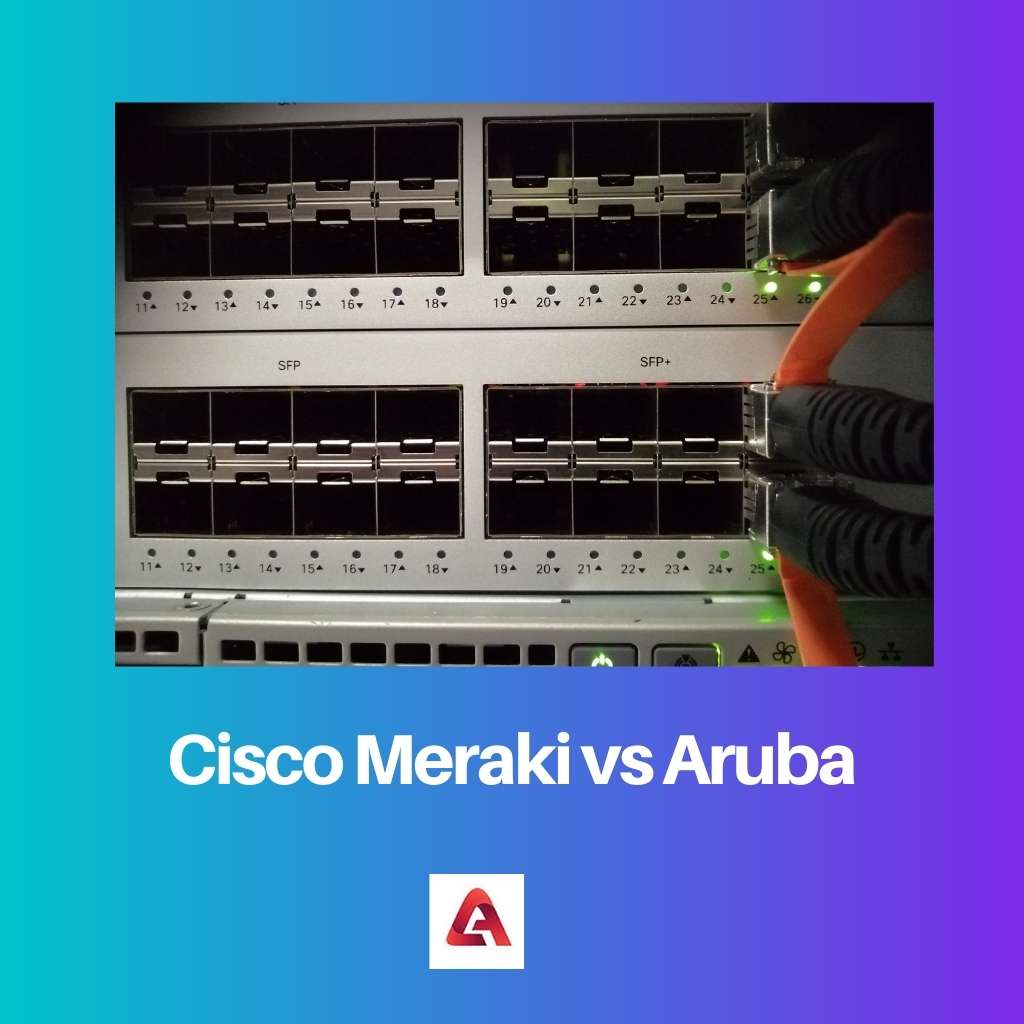In an increasingly globalized world that is powered by the latest technologies, it is impossible to stay out of the space called the internet. The internet has been in the world for a while now, and there are a lot of internet service providers today.
Cisco Meraki and Aruba are two of the most familiar service providers.
Key Takeaways
- Cisco Meraki offers a cloud-based networking solution that simplifies management and deployment, while Aruba provides both cloud-based and on-premises options.
- Meraki’s dashboard allows for centralized control and visibility of the entire network, whereas Aruba offers more granular control with its AirWave and ClearPass platforms.
- Both companies offer various products, including wireless access points, switches, and security appliances, catering to different business needs.
Cisco Meraki vs Aruba
Cisco Meraki is used to configure security for all devices and networks that the company uses through an internet-connected browser and is known for its easy use and low maintenance. Aruba provides protection by using advanced analytics and Machine Learning techniques and offers more enterprise features.

The word Cisco Meraki refers to the Cloud-managed information technology company that is headquartered in San Francisco. It was initially Cisco systems and acquired Meraki in the year 2012.
The company manufactures different products like wireless, security cameras, switching, and others. The networking hardware produced by Cisco Meraki is one of the popularly used wireless.
The word Aruba refers to the technology company that is headquartered in Santa Clara. It was founded in 2002 and was initially known as Aruba Wireless Networks.
The company Aruba was acquired by Hewlett Packard Enterprises in the year 2015. It continues to remain as a subsidiary of the tech giant.
Comparison Table
| Parameters of Comparison | Cisco Meraki | Aruba |
|---|---|---|
| Inception | The company was founded in the year 2006. | The company was founded in the year 2002. |
| Acquisition | Cisco Systems acquired Meraki in 2012. | Hewlett Packard Enterprises acquired Aruba in 2015. |
| Network Management | Cloud management is performed only by the Meraki dashboard. | Management can be done on Cloud, local, and on-premises. |
| Switches | Less PoE power and performance. | It has high PoE power with a multi-gigabit Ethernet. |
| User experience | No optimized user experience. | It provides an optimized user experience with radiofrequency innovation. |
What is Cisco Meraki?
The word Cisco Meraki is a popular term that almost all the households in the United States could identify. It refers to the Information Technology company that is Cloud-managed.
The company Cisco Meraki was founded in the year 2006. Cisco Meraki is headquartered in San Francisco in California.
It was initially known as Cisco Systems. The company acquired Meraki in 2012 hence the brand Cisco Meraki.
It is of great importance to understand the differences, advantages, and disadvantages between different wireless service providers. Being aware of these allows the buyer to make a well-informed purchase.
Cisco Meraki is well known for its wireless services, switching, and networking hardware and software in the United States. Their products are manufactured to provide the best radio frequency in high-density environments.
But it does not provide a user experience that is optimized to alleviate Wi-fi interferences.
Cisco Meraki’s wireless devices and networks can be managed through the Meraki dashboard. Cloud Management is only performed through the same dashboard, and it results in limited network control and security options.
Cisco Meraki’s products share similar specifications with others, but it has less PoE power and less efficient networks. Overall, Cisco Meraki’s wireless is arguably not the best performing device, but it has its own features of managing in a high-density environment.
What is Aruba?
The word Aruba is a popular term that almost all the households in the United States could identify. It refers to the famous technology company.
The company Aruba was founded in the year 2002. It is headquartered in Santa Clara in the United States.
It was initially known as Aruba Wireless Networks. The company Aruba was acquired by the tech giant Hewlett Packard Enterprises in the year 2015.
It is of great importance to understand the differences, advantages, and disadvantages between different wireless service providers. Being aware of these allows the buyer to make a well-informed purchase.
Aruba is well known for its wireless data communication goods. It serves both the wireless broadband providers and the enterprises in the United States.
Aruba continues to be the subsidiary of the HP corporation.
Aruba’s wireless devices and networks can be managed through Cloud, local, and on-premises. It provides a more scalable and flexible architecture that can help in transitions.
Network management in Aruba is simpler. Aruba’s products have high PoE power and highly efficient networks than its competitor, though they have similar specifications. It also has a multi-gigabit Ethernet that provides faster and more reliable networks.
Aruba also optimizes the user experience with radiofrequency innovations. Overall, Aruba has some of the best features for wireless, but it is not so efficient in high-density environments.
Main Differences Between Cisco Meraki and Aruba
- Cisco Meraki refers to the cloud-managed information technology company that was founded in the year 2006. Aruba refers to the technology company that was founded in 2002.
- Cisco Meraki was initially known as Cisco Systems and was headquartered in San Francisco. Aruba was initially known as Aruba Wireless Networks and was headquartered in Santa Clara.
- Cisco Networks acquired the company Meraki in 2012. Aruba was acquired by the tech corporation Hewlett Packard Enterprises in 2015.
- Cloud management in Cisco Meraki, can only be performed through the Meraki dashboard. Meanwhile, Aruba can be managed through Cloud, local, and on-premises.
- Cisco Meraki is less PoE performance but is efficient in high-density environments. Aruba has high PoE but is not so efficient in high-density environments.



